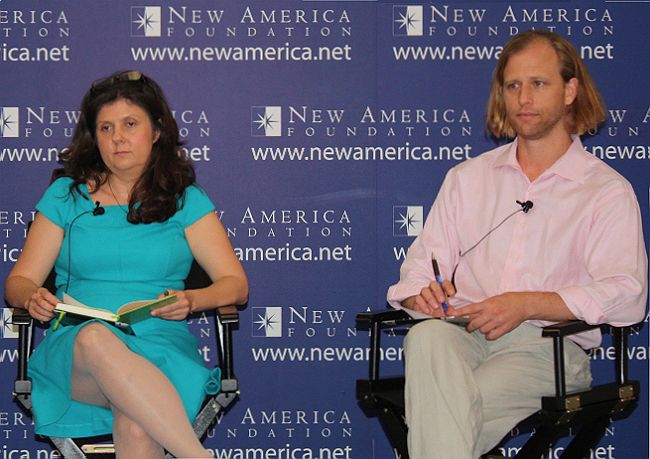
Betsey Stevenson and Justin Wolfers on a panel at New America Foundation conference in 2013.
Their panel was titled: Home Economics: How the Changing Economy Shapes Decisions
to Marry - or Not Marry. (Scroll down to the bottom for the video.)
Stevenson has a Rottweiler's expression, as though she's ready to swat someone (Wolfers?).
I don't blame her. Who wouldn't swat Wolfers, with his meek and subservient demeanor.
-------------------------------------------------------------------------------------------------------------------------------------------------------------
I posted a couple of days ago images of unhappy, and aggressive, young girls who were part of a toy campaign to have them play with toys made for boys. The girls, despite their initial interest in these toys, ultimately wanted "girl" toys.
I found this comment I made at Lawrence Auster's Veiw From the Right in 2010 while looking through my emails. The comment was posted in a discussion titled: The Factory Of Liberal Society Keeps Churning Out Its Quota Of Dead Young White Women.
A long and complex 2009 study on women's happiness shows that women lose ground to men (are unhappier than men), and older women are less happy than younger women. And "[Twelfth grade] girls have lost ground [in happiness] both absolutely and relative to boys."Critics of this study show that the numbers are insignificant, but in a scientific study context, they are statistically significant: i.e., the data mean something.
Twelfth grade girls, given a list of items and asked "How important is each of the following to your life? report a large number of these items with increasing importance, compared to boys. The list includes things like: "Having a good marriage and family life" to "Discovering new ways to experience things." It could well include "Running in marathons."
Twelfth grade girls in this study are overwhelmed with the expectations they adopt, and are more anxious and insecure (i.e. unhappy) in general than boys.
Although they seem happier than their mothers or grandmothers, their decline in happiness is predictable, if taken by their mothers' responses.
This study's results, coupled with the trust and innocence of teenage girls (not discussed/measured in the study), makes their "proud and sovereign" appearance not what it seems to be. And women's apparent pride and sovereignty in general. Although one would think by this study that teenager girls are more confident and happier (proud and sovereign) than their older relatives. Another one of those instances where facts debunk wishful thinking.
Here is the full pdf file of the study: The Paradox of Declining Female Happiness. By Betsey Stevenson and Justin Wolfers.
Wolfer and Stevenson try to explain this declining female happiness, although I think another study which targeted the portion of women who responded with "yes, my happiness is declining" and asked them variations on "why are you unhappy" would be an important follow-up study.
This follow-up study never occurred, but Stevenson and Wolfers continue with another equally fascinating topic about the relationship of men and women in a household where both hold careers. They don't quite present it like that, but I have analyzed it in that context.
Below is a transcript of some sections of the conference Home Economics: How the Changing Economy Shapes Decisions
to Marry—or Not Marry, presented by Betsey Stevenson and Justin Wolfer in 2013. Here is the full video. They haven't come up with any explanation for this decline in
Stevenson: In our household...I do all the bills and all the taxes, and manage all the money.Of course, like all female feminists, Stevenson wants the best of both worlds. She can act all "girlie" and confused when it comes to technology (really, how hard is it to figure out house-hold appliances and home exercise machines?), but no toddler or infant will get in the way of her career ("We have a three-year-old and an eight-month-old" announces Stevenson). And she can get her "career" too.
Wolfers: And I have no idea how much money I have...
[Belly laugh from Stevenson]
Stevenson: And Justin deals with all the bills and all the technology. I can barely turn on...Every time I go on the treadmill I go "how does this TV turn on again?"
This must be a parasitic relationship. Wolfers and Stevenson must benefit from the double income. I wonder how much of the household chores Wolfers really does? Stevenson implies that modern domestic work is relatively easy, with all the gadgets. But someone still has to cook the dinner and clean the bathroom, albeit with fortified and quick-acting detergents. And there are the children. I assume it is her who takes care of these by maneuvering a large supply of nannies and day-cares. I assume also that she makes the meals, or at least prepares the food in advance and stores it in color-coded tupperware for her husband to defrost and serve when she's out on her after-hour missions. Then she might even take an extra hour after work to buy that new perfume, or the pair of shoes she saw recently in some fashion magazine. Or take a "girl's night out" for a drink of wine with other career women at an expensive downtown bar one day a week. And of course there will be the hair stylist, the cosmetician, the manicures and pedicures, the spa. Her ragged look in the conference photo above should not fool us. And all this costing her several thousand over the course of the year.
I wonder what "gadgets" Wolfers gets for his suffering? A boat for the summer? A "man cave" in the basement, replete with an HDTV, a surround sound music system, and a state-of-the-art Laz-Y-Boy?

This article informs us that Wolfers' hobby is "running."
If You Run the Numbers, It's a Good Time:Running doesn't cost much money, except for the initial investment in a $200 pair of sneakers (I can't see Wolfers going for $50 running shoes) and a monthly gym membership fee of $75, which will set him back $1,000 for the year (he just couldn't share that treadmill with his wife).
I'm not just an economist, I'm also a runner, training for the Marine Corps Marathon.
Runners World magazine recently argued that marathon running is an incredibly cheap sport. All you need is a pair of shoes, and you're off and running. But they're wrong.
You see, they were emphasizing the out-of-pocket cost, which is small. But the foundation of all economics is something called opportunity cost. It says that the true cost of something is the alternative you have to give up.
So each hour that I spend running is an hour that I don't spend hanging out, working, or sleeping. How do I choose? Following economic theory, I keep doing an activity only as long as it yields greater benefits than the alternative.
And as I spend my hours slugging out the miles, I'm forced to confront my choices. Instead of sweating it out on the trails, I could take on extra teaching and earn a few extra bucks. And so going running costs me good money.
The same logic applies to you. Each hour you spend on your hobby is an hour you don't spend working harder to get a promotion, studying for a degree, or shopping around for the cheapest groceries.
By my calculations my 16-week training program comes at an opportunity cost of several thousand dollars. A quicker runner would have a smaller opportunity cost. It's only because I'm both slow and an economist that I fret that the world's cheapest sport is actually incredibly expensive.
But to an economist, the choice is still a no-brainer. We think you should only do what you love, and pay for it by doing what you are good at.
By sticking to economics, I make time for running. Rather than spend hundreds of dollars worth of time cleaning my house each Sunday, I hire a cleaner, who does a better job, at a better price.
When a friend asks me to help them move, I write them a check to pay professional movers instead. It's just more efficient.
And while it can be hard to forgo extra income for a long run, it is even harder to justify wasting that time on Facebook. And with the time that saves, I'm pulling on my shoes to head out for another run.
But Wolfers clearly understands that the cost for his running is not necessarily monetary, but the time he cannot (does not, will not) spend with his wife and family. Perhaps his running is a ruse to avoid spending time with them, in that chaotic house where he will be shouldered with the chore of the evening.
The goal of women is marriage, however much they deny it. I doubt that Wolfers would want marriage with Stevenson, as is the nature of men unsure of their women, especially emasculating ones like Stevenson. Marriage, with its life-binding promises, with the burden placed higher on males, is something to be avoided with women like Stevenson.
In the meantime, Wolfers gets to work in a career and have a extra money around from his wife's income. Although, Stevenson is clearly the more advanced, career-wise (here is the Wikipedia profile for Stevenson, and here is Wolfers'). At some point, Wolfers who will have to deal with a discontented wife, making more "family" demands on him to come home earlier, take the kids skating or soccer, help with the dishes. And why not the cooking too?

Baby Duty
He surely gets what he deserves. But, since he won't see it like that, at some point he will have to contend with a wife who files for divorce, or a separation. Perhaps she might even suspect him of/catch him cheating.
I thought Stevenson's corpulence and sloppiness (in the top photo) was because of a pregnancy. But, she's eight months past her second child's birth at that point. She just seems overwhelmed with "How does this treadmill work" and "How do I continue with my fast-paced career which won't sync with my breast-feeding and nappy-changing schedule?" I suspect she has a plethora of nannies to feed her expressed breast milk to her infant, and might even bring her baby to her office on "light" days to show what a mom she is. I think all this adds to her her frazzled look of overwhelmedness, which I think is really guilt, buried deep at leaving her children, and husband, behind for a career. And she looks far older than Wolfers, although he is only a year younger. She looks like she could be his mother.

Above is a photo of Stevenson that is profiled in articles as far back as 2008. She has on make-up, and looks pretty. She must resemble the younger woman Wolfers met as a graduate student in Harvard, when they were both twenty-somethings (Stevenson graduated from Wellesley College in 1993, and I would estimate at twenty-three, and from Harvard in 2001, when she must have turned thirty). In her most recent photo (see the top of the blog for one taken in 2013), she looks like she's simply aged. Two toddler children, a full-time career, and a live-in "partner" don't make for an easy life.
Wolfers is no better, with his longish hair, chopped off as though to deny he grooms it carefully (this is a carefully styled hairstyle to look nonchalent and "radical"). Although he looks like he's regressed back to some college era age in his most recent photos.
But, he has a fanatical look which come through when he's discussing the evils done to mankind before Obama came to save it in this video at a Brookings Institue conference taken in 2013. He is a true Obama disciple. His views seem as though he's supporting "rich kids'" ability to transfer to non-paying public pre-schools. But then he faults their move by saying that the "poor kids" would be crowded out by these rich kids, who's greedy parents would rather have the option of sending their children to the non-paying public schools.

Image from the video at a 2013 Brookings Institute conference
Odd logic, these lefties. Surely a rich parent wouldn't want his children to receive mediocre education, as well as the plethora of dangers the child could face in a government subsidized poor school? Surely he will do his best to give quality care, on all counts, for his children and family, and that would include quality day-care, even at a cost?
Wolfers' reverse logic is of course that rich kids could also be crowded out of pre-schools by poor kids entering these schools through various subsidies. But these rich kids would then be forced to enter the free public pre-schools due to overcrowding by poor kids in their own rich schools, in turn crowding out those poor kids left behind without subsidies to enter rich schools. I knew there was a catch when he started "supporting" rich kids. I had to listen to his video, and read a couple of posts, before I could surmise the above [these links might be helphul: a and b).
He must have learned his tactics for arguments from Obama, his mentor.
Such are the convoluted personalities of the liberal elite, who live their public lives advocating for the poor, yet everything they do in their personal lives depends on a large stash of income.
Stevenson and Wolfers have two children, a daughter who is about four, and a son who is about one. It will be interesting to see how the "rear" these children, and if they will have found solutions to increasing the happiness quotient of girls. And what woudl they do if their doaughter wanted a full-own, wedding-dress including, church wedding (miracles do happen.) Would they attend, or would they refuse the invitation out of principle? Or if their son, as a macho teenager laughed at his father's dishwashing ways?
As I wrote above, there are many sequels to this research waiting to be written.
-------------------------------------------------------------------------------------------------------------------------------------------------------------
Posted By: Kidist P. Asrat
-------------------------------------------------------------------------------------------------------------------------------------------------------------
